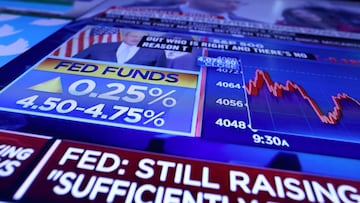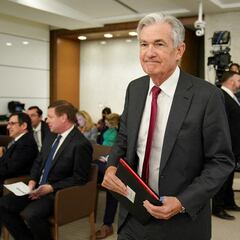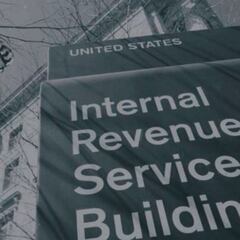How does the Fed interest rate hike affect mortgages, student loans and credit cards?
The Federal Reserve has introduced yet another increase in interest rates to help curb inflation. We take a look at how this could affect consumers...

The Federal Reserve has announced yet another interest rate increase, moving the federal funds rate up to 5-5.25 percent. The announcement of another increase which came on 3 May led rates to rise above five percent for the first time since The Great Recession.
The federal funds rate is set by the Fed and is used as a benchmark with which banks borrow and lend to each other. It is not the exact rate that customers experience, but the two are closely linked.
The Fed is hoping that continuing to raise rates will cool the economy by discouraging borrowing. However, for those who already have some kind of credit mechanism or loan, this strategy has been costly. We take a look at the consequences for some of the most common types of borrowers...
Mortgages
Typical mortgage rates in the United States are not specifically tied to the federal funds rate, rather they track the yield on 10-year Treasury Bonds. The value of the bonds is related to the Fed’s economic outlook, and further interest rate hikes do not convey confidence from the central bank.
Tomorrow, the Federal Reserve will release updated figures for both 15-and-30-year fixed-rate mortgages, which are expected to rise from their current levels of 5.71 percent and 6.43 percent, respectively. Compared to this time last year, both rates have increased by more than 2.5 percent. However, in recent month these rates have softened slightly, compared to the levels recorded when the Fed first began raising rates.
While those with fixed-rate mortgages will not see any change to the rate applied to their principal balance, those looking to purchase a home will end up paying a higher price than they would have last year. The benefit for current buyers is that as rates increase and the cost of a mortgage goes up, some buyers will leave the market, which should bring down home prices. However, the Bureau of Labor Statistics reported that increases in housing costs drove around seventy percent of the 0.4 percent increase in consumer prices seen in February. In March, housing costs continued to drive up prices.
Average interest rates for fixed-rate mortgages diverge in the week ended April 27: the 30-year rose to 6.43% while the 15-year fell to 5.71% https://t.co/lYHScSjJWl pic.twitter.com/mPb0LpN1TK
— St. Louis Fed (@stlouisfed) April 30, 2023
Student loans
There’s better news for student loan borrowers because existing federal student loans are subject to a fixed rate of interest set by the government. They are tied to the rate of 3.73%.
If you have not yet taken out a federal student loan but will have one disbursed after 1 July 2023, you will be subject to a higher rate of 4.99%. This rate will remain fixed.
Anyone who took out a private student loan will likely be paying more, regardless of whether they went for a fixed- or variable-rate loan. Both are linked to the federal funds rate so the interest rates will increase accordingly.
Credit cards
Related stories
Of all the forms of borrowing available to consumers, credit cards are perhaps the kind most sensitive to changes in interest rates. The alterations are done by each bank individually and often vary across different types of cards.
However, once an interest rate hike is introduced, borrowers will usually see their own interest rate rise within one or two billing cycles.

